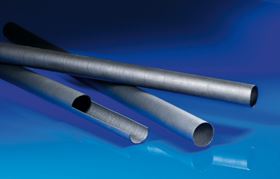 Composite pipes for seawater desalination. (Picture © Fraunhofer IFAM.)
Composite pipes for seawater desalination. (Picture © Fraunhofer IFAM.)In the desalination process seawater is sprayed onto pipes which are heated by pumping hot gas or hot water through them. Pure water evaporates from the seawater, leaving a salty sludge behind.
The material the pipes are made of must conduct heat and resist corrosion, and for the water to evaporate properly the piping must also be easily coated with seawater. This is why titanium and steel alloys have been used to date. But these materials are very expensive and demand for titanium is also constantly on the rise.
Researchers at the Fraunhofer Institute for Manufacturing Technology and Advanced Materials IFAM in Bremen, Germany, are now developing an alternative to the titanium tubes – pipelines made of polymer composites.
To make the polymer heat-conducting, the researchers introduced up to 50% percent copper microfibres by volume into the material.
"This does not change the processing properties of the composite, and it can still be processed as any other polymer would,“ notes Arne Haberkorn, a scientist at IFAM.
The researchers now want to optimise the material's thermal conductivity. To accomplish this, they are installing the piping in a pilot seawater-desalination plant to test its thermal conductivity, see how much of a microorganism-based coating forms on the pipes, and how heavily the material corrodes in its salty surroundings. They will then optimise the composite's properties based on the results.